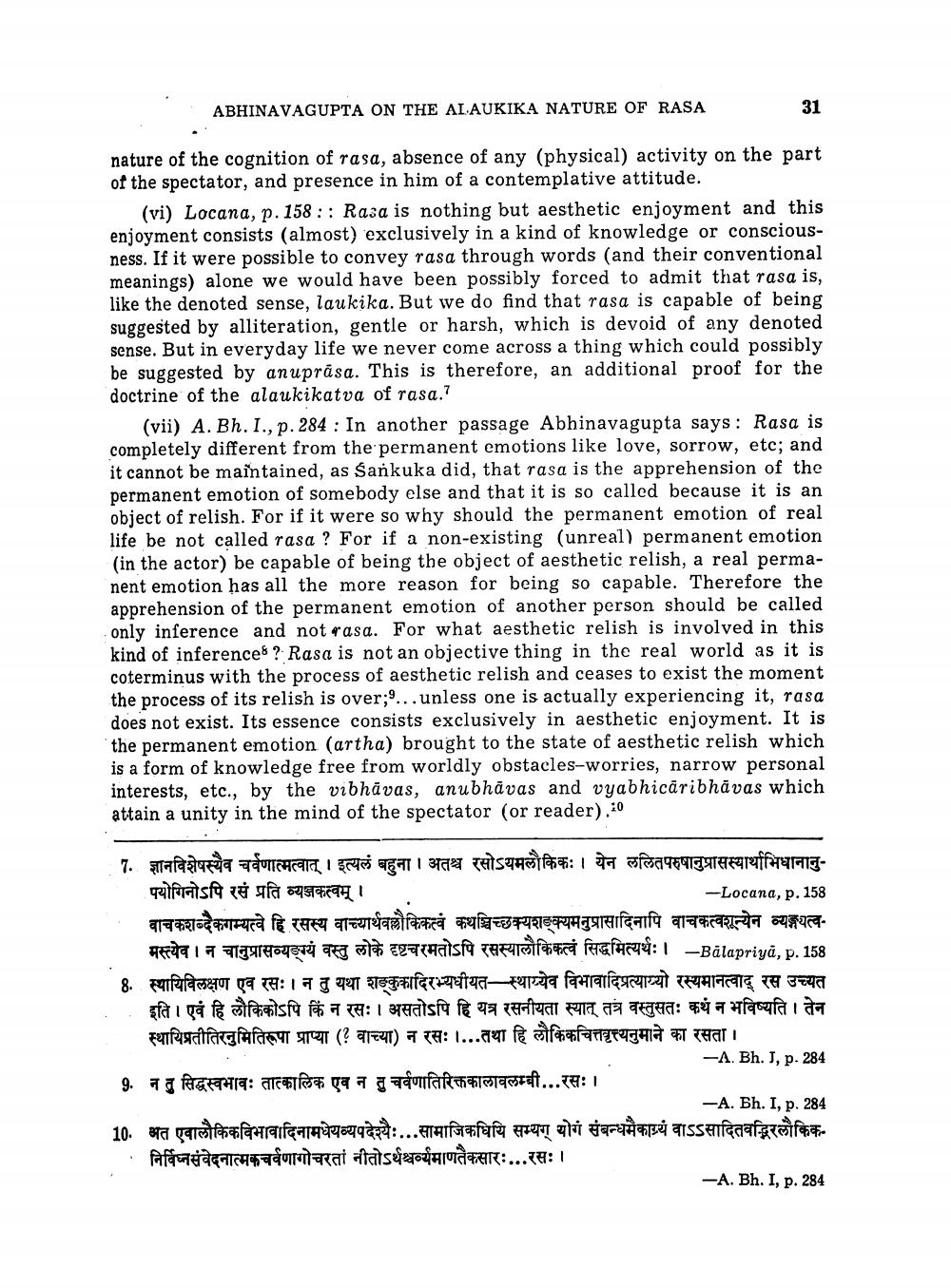________________
ABHINAVAGUPTA ON THE ALAUKIKA NATURE OF RASA
31
nature of the cognition of rasa, absence of any (physical) activity on the part of the spectator, and presence in him of a contemplative attitude.
(vi) Locana, p. 158 :: Rasa is nothing but aesthetic enjoyment and this enjoyment consists (almost) exclusively in a kind of knowledge or consciousness. If it were possible to convey rasa through words (and their conventional meanings) alone we would have been possibly forced to admit that rasa is, like the denoted sense, laukika. But we do find that rasa is capable of being suggested by alliteration, gentle or harsh, which is devoid of any denoted sense. But in everyday life we never come across a thing which could possibly be suggested by anuprāsa. This is therefore, an additional proof for the doctrine of the alaukikatva of rasa.?
(vii) A. Bh. I., p. 284 : In another passage Abhinavagupta says : Rasa is completely different from the permanent emotions like love, sorrow, etc; and it cannot be maintained, as Sankuka did, that rasa is the apprehension of the permanent emotion of somebody else and that it is so called because it is an object of relish. For if it were so why should the permanent emotion of real life be not called rasa ? For if a non-existing (unreal) permanent emotion (in the actor) be capable of being the object of aesthetic relish, a real permanent emotion has all the more reason for being so capable. Therefore the apprehension of the permanent emotion of another person should be called only inference and not rasa. For what aesthetic relish is involved in this kind of inferences ? Rasa is not an objective thing in the real world as it is coterminus with the process of aesthetic relish and ceases to exist the moment the process of its relish is over;9... unless one is actually experiencing it, rasa does not exist. Its essence consists exclusively in aesthetic enjoyment. It is the permanent emotion (artha) brought to the state of aesthetic relish which is a form of knowledge free from worldly obstacles-worries, narrow personal interests, etc., by the vibhāvas, anubhāvas and vyabhicãribhāvas which attain a unity in the mind of the spectator (or reader).20
7. ज्ञानविशेषस्यैव चर्वणात्मत्वात् । इत्यलं बहुना । अतश्च रसोऽयमलौकिकः । येन ललितपरुषानुप्रासस्यार्थाभिधानानुपयोगिनोऽपि रसं प्रति व्यञ्जकत्वम् ।
-Locana, p. 158 वाचकशब्दैकगम्यत्वे हि रसस्य वाच्यार्थवल्लौकिकत्वं कथञ्चिच्छक्यशक्यमनुप्रासादिनापि वाचकत्वशून्येन व्यङ्गयत्व
मस्त्येव । न चानुप्रासव्यङ्ग्य वस्तु लोके दृष्टचरमतोऽपि रसस्यालौकिकत्वं सिद्धमित्यर्थः। _Balaprina 8. स्थायिविलक्षण एव रसः। न तु यथा शङकुकादिरभ्यधीयत-स्थाय्येव विभावादिप्रत्याय्यो रस्यमानत्वाद् रस उच्यत
इति । एवं हि लौकिकोऽपि किं न रसः। असतोऽपि हि यत्र रसनीयता स्यात् तत्र वस्तुसतः कथं न भविष्यति । तेन स्थायिप्रतीतिरनुमितिरूपा प्राप्या (? वाच्या) न रसः ।...तथा हि लौकिकचित्तवृत्त्यनुमाने का रसता।
-A. Bh.J, p. 284 9. न तु सिद्धस्वभावः तात्कालिक एव न तु चर्वणातिरिक्तकालावलम्बी...रसः।
-A. Bh. I, p. 284 10. अत एवालौकिकविभावादिनामधेयव्यपदेश्यैः...सामाजिकधियि सम्यग् योग संबन्धमैकाग्र्यं वाऽऽसादितवद्धिरलौकिकनिर्विघ्नसंवेदनात्मकचर्वणागोचरतां नीतोऽर्थश्चय॑माणतकसारः...रसः।
-A. Bh. I, p. 284




